IMMIGRATION BASICS: UNDERSTANDING THE "GREEN CARD"
For many newcomers, obtaining their green card takes them one step closer to their dream of American citizenship. When you have a green card, you are a legal permanent resident who can live and work in the United States.
Other benefits include:
- Applying for U.S. citizenship after five years
- Sponsoring relatives to join you in the U.S.
- Becoming eligible for Social Security benefits after working for at least 10 years
- Traveling outside the country without losing your status
There are three primary ways of obtaining a green card. Let’s take a closer look at the requirements and procedures behind each one.
How to Obtain a Green Card
1. THROUGH FAMILY SPONSORSHIP
This is one of the most popular ways of becoming a permanent resident. You may be eligible for a green card if you are:
- An immediate relative of a U.S. citizen. Immigration law defines an immediate relative as a spouse, unmarried child under 21, or a parent. (Citizens petitioning for their parents must be at least 21 years of age.)
- An adult child, married child, or sibling of a U.S. citizen over the age of 21
- A family member of a current green card holder
If you are an immediate relative, you may receive a visa without having to wait for one to become available. Other relatives of U.S. citizens and green card holders are considered preference relatives and must wait for a visa, as a limited number are issued every year.
If you are outside the United States, your U.S. citizen or green card holder relative will file a Form I-130: Petition for Alien Relative. On arrival, you can apply to change your status to permanent resident by filing Form I-485: Application to Register Permanent Residence or Adjust Status. If you are in the country, both forms can be filed at the same time.
Other family-based immigrant categories include:
- The battered spouse or child of a U.S. citizen or green card holder
- The widow or widower of a U.S. citizen
- The American-born child of a foreign diplomat
If you are in any of these categories, you will file Form I-360: Petition for Amerasian, Widow(er), or Special Immigrant.
2. THROUGH EMPLOYER
If you receive a job offer, your employer can sponsor you by getting a labor certification from the U.S. Department of State and filing Form I-140: Immigrant Petition for an Alien Worker. You may also self-petition as an entrepreneur or investor if you intend to invest at least $1,000,000 into a business that will create at least 10 jobs for U.S. citizens or green card holders within two years. ($500,000 if you invest in a targeted employment area.) After arriving on an E-2 or EB-5 visa, you would apply for permanent residency and a green card by filing a Form I-485.
Like the family-based category above, there are special employment-based immigration options. For example, you may be able to get one if you have extraordinary abilities in the sciences, arts, and athletics, but successful applicants tend to be Olympic athletes, Nobel Prize winners, and other high achievers in their field.
3. THROUGH REFUGEE OR ASYLEE STATUS
If you enter the U.S. as a refugee or asylee, you must apply within one year of entering the country or being granted asylum. In either case, you do not have to file an immigrant petition if you are eligible for a green card.
No matter which category you use, once you are in the United States, U.S. Citizenship and Immigration Services (USCIS) will review your petition for permanent residency and schedule an interview. If your application is successful, you will receive a 10-year green card.
Contact an Experienced Atlanta Immigration Attorney about Your Green Card
When you want to obtain a green card and eventually become a U.S. citizen, your chances of a successful petition improve when you work with an experienced immigration attorney. At the Law Office of Judith Delus, P.A., we care about your future and find it highly rewarding when we can unite families and make it easier for investors, skilled workers, and refugees or asylees to make a permanent contribution to the U.S. culture and economy. To schedule a consultation with Attorney Delus and her team, call (678) 679-6415 or contact us.





